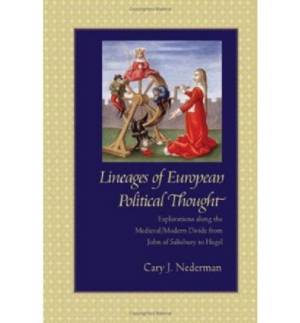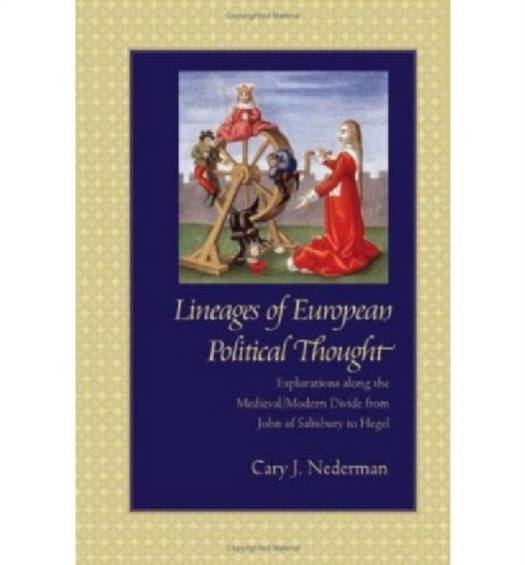
- Afhalen na 1 uur in een winkel met voorraad
- Gratis thuislevering in België vanaf € 30
- Ruim aanbod met 7 miljoen producten
- Afhalen na 1 uur in een winkel met voorraad
- Gratis thuislevering in België vanaf € 30
- Ruim aanbod met 7 miljoen producten
Lineages of European Political Thought
Explorations Along the Medieval/Modern Divide from John of Salisbury to Hegel
Cary J NedermanOmschrijving
This book examines some of the salient historiographical and conceptual issues that animate current scholarly debates about the nature of the medieval contribution to modern Western political ideas. On the one hand, scholars who subscribe to the "Baron thesis" concerning civic humanism have asserted that the break between medieval and modern modes of political thinking formed an unbridgeable chasm associated with the development of an entirely new framework at the dawn of the Florentine Renaissance. Others have challenged this hypothesis, replacing it with another extreme: an unbroken continuity in the intellectual terrain between the twelfth and the seventeenth centuries (or later). The present book seeks to qualify both of these positions. Cary J. Nederman argues for a more nuanced historiography of intellectual continuity and change that depends upon analyzing a host of contextual as well as philosophical factors to account for the emergence of the European tradition of political theory in the medieval and early modern periods. He finds that categories such as "medieval" and "modern" can and should be usefully deployed, yet always with the understanding that they are provisional and potentially fluid.
The book opens with an introduction that lays out the main issues and sources of the debate, followed by five sets of interrelated chapters. The first section critically assesses some of the leading scholars who have contributed to the current understanding of the relationship between medieval and modern ideas. The central part of the book includes three sections that address salient themes that illuminate and illustrate continuity and change: Dissent and Power, Empire and Republic, and Political Economy. The volume closes with a few examples of the ways in which medieval political doctrines were absorbed into and transformed during the modern period up to the nineteenth century.
ABOUT THE AUTHOR:
Cary J. Nederman is professor of political science at Texas A&M University and author of numerous published works including Machiavelli, John of Salisbury, Worlds of Difference: European Discourses of Toleration, c. 1100-c.1550, and Medieval Aristotelianism and Its Limits.
PRAISE FOR THE BOOK:
"In this technical yet illuminating book, Nederman authors a series of essays animated by a single purpose--to steer historians of political thought away from two extremes when studying "modern" and "medieval" ideas. . . . He illustrates his method through fascinating studies of Marsiglio of Padua, Machiavelli, Filmer, Bracton, and others. . . . Highly recommended." -- D. J. Lorenzo, Choice
"This book should be read by everyone who is concerned with the history of ideas and the defects of modernity."--Antony Black, Review of Politics
"Cary J. Nederman is one of the leading political theorists of the Middle Ages and Renaissance, whose work on John of Salisbury and Machiavelli, among others, has helped to define the modern understanding of the medieval political mind. This collection of essays. . . is a distillation of Nederman's most recent thinking about medieval political theory and what it might teach us about modern political structures. . . . [A]s a synthesis of major concepts in medieval political theory, and modern responses to them, this book is invaluable." --Helen Fulton, Parergon
"[The book] is a work of intellectual subtlety: Nederman tackles the contentious and complex issue of continuity and discontinuity between the Middle Ages and modern times in the history of European political thought from four different angles. . . . [T]he book powerfully demands that its readers appreciate the immense complexity associated with such categories as 'medieval' and 'modern' in the history of political thought. It surely promises to occupy a center stage of scholarly debate." --Takashi Shogimen, Sixteenth Century Journal
Specificaties
Betrokkenen
- Auteur(s):
- Uitgeverij:
Inhoud
- Aantal bladzijden:
- 375
- Taal:
- Engels
Eigenschappen
- Productcode (EAN):
- 9780813215815
- Verschijningsdatum:
- 14/04/2009
- Uitvoering:
- Paperback
- Formaat:
- Trade paperback (VS)
- Afmetingen:
- 150 mm x 224 mm
- Gewicht:
- 635 g

Alleen bij Standaard Boekhandel
Beoordelingen
We publiceren alleen reviews die voldoen aan de voorwaarden voor reviews. Bekijk onze voorwaarden voor reviews.







